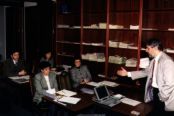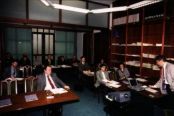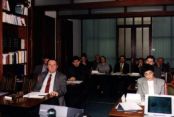<< Back to the contents of "About NHH"
COURSES AND TRAININGHow to apply for the research programmes of the EU?There is an increasing interest in the research and development programmes of the EU. In addition to the universities and research institutes, a great number of smaller or larger businesses and institutions show interest in the new international project opportunities. Plenty of new opportunities are available for co-operating with the leading actors of science and technology, accelerating the development programmes and, last but not least, sharing the substantial expenses of innovation. The use of these benefits by a greater number of companies could accelerate the development of the country as well. But just like in the case of many other important things it is not appropriate to "go bang" at EU tenders, driven by the first enthusiasm. You are recommended to thoroughly familiarise yourself with the programme and the application system, compare the expected benefits of participation with the unforeseeable difficulties of international co-operation and find an expert to establish the contacts and write the application. Orientation is facilitated by the courses of the National Host of Hungary. They are available free of charge for the member organisations of the Host, while a reasonable fee is charged to other participants for the carefully built lectures delivered in a series of 4x4 hours. According to the information provided by Executive Officer Dr. Zsolt Balassy, the Host organises advanced courses as well, offering an even deeper insight into the financing, legal and other aspects. Key to success, reasons for failuresAnyone applying for a sixteen-hour course of the Host can be convinced that the lecturers not only teach but they do know what can be known about the European Union, the 5th Framework Programme, the research, development and dissemination of the information society technology (IST) and the prospects of the applications. The application procedure and the structure of the framework programme including the IST programme as parts of the thoroughly compiled programme are explained by Lajos Nyiri and Vilmos Bognár whose names are well-known in the world of research and development. The EU organisations, the possibilities of participating in the tenders, the content requirements, financial planning and legal conditions are expounded by Attila Zsigmond, head of the Brussels office. The possibilities and methods regarding the collection of information for the tenders are introduced by Béla Murányi and Erika Szendrák. And taking into account that new information becomes absorbed the best in practice, the organisers provide an opportunity for the individual and collective evaluation of application proposals, guided information retrieval from the Internet and even for the writing of applications. After the training, the participants evaluate the keys to the expected success and the probability of failure because of the possible mistakes so that they can build on it to prepare successful applications in the future. The courses to date were attended by diverse groups. The lectures were attended and tried to be applied in practice by experts of administrative institutions and authorities such as the Office of the Prime Minister, the Municipality of Kalocsa and the Chief Communications Inspectorate (HÍF), educational and research institutions such as BME (Technical University of Budapest), ELTE (Eötvös Lorand University) and MTA SZTAKI, non-profit organisations such as the Theodore Puskas Foundation and PROMEI and companies and other businesses such as Antenna Hungária, Innomed Medical Rt, Magyar Posta, MATÁV PKI, Új Képújság Kft and Vivendi. Zoltán Vándor of Vivendi attended a course on behalf of the local telecom operators (LTOs). He said the course was helpful not only in improving the chances for participating in EU tenders but in contributing to the successful participation in domestic tenders as well. The courses also create a good opportunity for familiarisation with the approach that is gaining ground throughout the European Union. One can benefit from this as well because the liberalisation of the telecommunications market and the subsequent EU membership will create new circumstances for which it is advisable to become prepared in due time. Oszkár Kovács manages special projects at the technical division of Pantel. He believes that the evolution of the information society generates projects requiring an increasing number of services in health care, distance teaching, the dissemination of digital library information and many other areas. It is worthwhile to prepare for these new challenges and receive the potential partners with "tailored" offers. They must also be aware that the solutions sometimes call for international co-operation and tender participation. If such a situation occurs at the company, he will know how to get started and where to seek advice or help. IT IS WORTHWHILE BECOME PREPAREDIt is increasingly understood in professional circles that the EU programmes offer excellent opportunities for development because Hungary can participate in the 5th framework programme on equal terms with the EU Members States. It is in the interest of the national economy to better exploit the opportunities of the tender system and considerably increase the number of companies and institutions applying for the tenders. The primary goal is to achieve quick and efficient development of the technical, technological culture rather than a return on Hungary's contribution. Cost/benefit is not indifferent, of course. That is why it seems worthwhile to avail ourselves with the opportunities offered by the EU. The participation of small- and medium-sized businesses is especially encouraged by the Union. The tenderers' motivation is an important issue. It is not fortunate to recognise the opportunities provided by the EU's 5th framework programme as a substitute for the missing development resources rather than as a chance for implementing corporate strategy and establishing international contacts. They can increase their competitive capacities and gain other benefits if their tender applications fit into the corporate strategy. It is to be taken into account, however, that the know-how has to be shared with the foreign partner in consideration of the financial resources to be raised by means of the tender. A careless applicant may be exposed to the risk of inproportionateness of the benefits of the intellectual values or the work done in a hastily prepared project. Each business has to decide itself whether to realise its ideas within the framework of a consortial research and development project of the EU or in some other way. If a decision is made in favour of an international tender, it is advisable to use the assistance of experts skilled in EU projects. A larger company or institution might even employ a competent and well-prepared expert who spends most of his/her working time and energy on the collection of information about EU framework programmes, the building of international professional contacts and the preparation of tender applications. But not each applicant can afford the costs of such an expert. They should rather approach a professional organisation specialised in the establishment of contacts. The development of a network of consultants specialised in the building of contacts and writing tender applications that also satisfies future needs is still to be waited for but there are already many non-profit or profit-oriented entities involved in such activities. One can even choose from the supply after gathering sufficient information. But how can a small business pay the costs of an expert? It is good to know that there are contracts containing success fees where the expert hired for writing the application and building the contacts will receive payment only in case of success or the success fee will only supplement the agreed basic fee. The tender applications are also helpful in raising funds for the setting up of consortia. In Hungary, the former OMFB (National Board for Technical Development), now the deputy state secretariat for research and development of the Ministry of Education, finances the expenses of writing tender applications and establishing contacts up to HUF 1 million. And small businesses may apply even for a fivefold or sixfold amount from the European Union. The possibilities of these tenders are not exploited at all in spite of the fact that the applicants are not required to advance these expenses. According to the established Hungarian practice it may occur that a manager wants to know and solve everything on his/her own. That makes no sense. In the European Union, thousands of people are engaged in the development and regular update of new procedures, methods, techniques and application forms. The completion of application forms requires the knowledge of not only the contents of a single sheet but the related information package and the guide used by the evaluators as well. This makes at least a total of 250-300 pages. And there are always new lines in the documents because of the continuous updates. New items are not so many but one should know what has changed and when. This is impossible to be followed by researchers or the managers of laboratories or companies. One should continuously deal with the topics to be fully informed. It is interesting to note that the 5th Research and Technology Development Framework Programme caused many surprises even to the experienced applicants. It is substantially different from the previous ones due to its more sophisticated application culture, the change in conditions and the methods of accounting. The decision-making mechanism is also different. One of the new elements is that a single sentence is not enough to answer the question about intellectual property. This may reduce the number of unpleasant surprises to the applicants who need to prepare more carefully also in this respect. It results from the market focus of the framework programme that the application should reflect a stronger project management approach than it did before. In addition to formulating the exceptional scientific concepts, the ways of information flow, the decision-making mechanism, the planned milestones and dates of implementation and the persons responsible for each phase should also be defined. The lecturers at the courses of the National Host of Hungary are trying to make the participants realise that this activity requires professional work and thorough preparation. It does not require academic or professorial skills but many and continuous efforts are needed to acquire and maintain the necessary know-how. It is very important that he person entrusted with the task have good abilities to make contacts and resolve conflicts because he/she has to co-ordinate different approaches to set up the consortium and write the application within 3-5 months. The National Host of Hungary has organised two training courses so far. The participants were satisfied with the structure of the courses. They believed that the most important questions regarding the writing of tender applications had been answered. Most of the participants were not experienced EU tenderers and much information was new to them but even those familiar with the 3rd and 4th framework programmes encountered many new things. The sixteen-hour course did not aim to create professional applicants but to make them capable of deciding whether they want to acquire much further knowledge and, if they do, to make them capable of improving their knowledge independently in the future. Those who have already written or are writing applications demand advanced courses in the second half of the year. Of course, the lecturers of advanced courses will not speak of the structure of the 5th framework programme or the importance of management but they would solve the problems and case studies together with the participants. They will address concrete management problems and discuss topics such as co-financing, personal income tax, value-added tax, negotiation strategies or specific questions regarding intellectual property. The organisers will involve experienced staff from the Brussels office, specialist lawyers and other experts. The main goal is to answer the questions of those who want to take part in the programmes of the EU as well-prepared, good partners.
Copyright © MNH 1999 |


